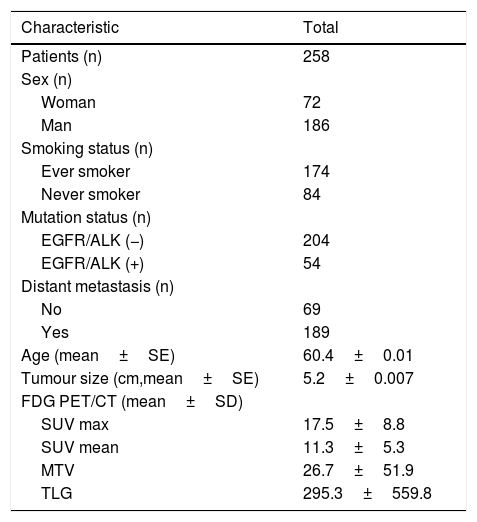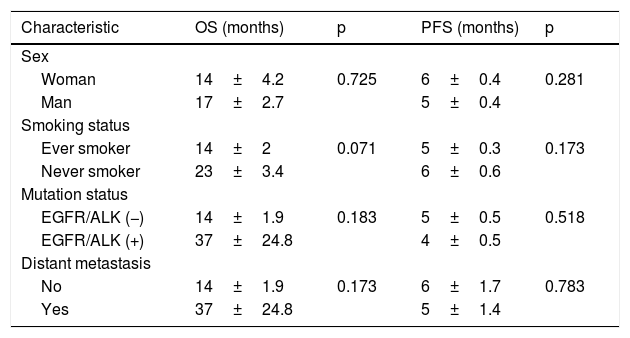The present study evaluates the prognostic value of metabolic parameters related to the primary tumor on pretreatment 18F FDG PET/CT in patients with advanced stage lung adenocarcinoma.
Material and MethodsThis retrospective study included 258 patients with advanced stage lung adenocarcinoma who underwent pretreatment PET/CT scan, and for whom epidermal growth factor receptor (EGFR)/anaplastic lymphoma kinase (ALK) status was available. The maximum standardized uptake value (SUVmax), SUVmean, metabolic tumor volume (MTV) and total lesion glycolysis (TLG) related to the primary tumor at the baseline PET and various clinical factors were recorded. The relation between these factors and overall survival (OS) and progression-free survival (PFS) was evaluated.
ResultsThe study included 258 patients with stage IIIB-IV lung adenocarcinoma (72 female, 186 male, mean age 60.4±10.4 years), 210 of which died and 243 of which progressed at the time of analysis. The median OS and PFS of the patients were 16±1.9 and 5±0.5 months, respectively. The present study revealed no significant relation between OS or PFS and gender, smoking status, presence of distant metastasis, age and tumor size. There was no significant difference in the OS and PFS of patients testing negative for EGFR mutations/ALK rearrangements and those testing positive for both or either of the EGFR mutations and ALK rearrangements. OS was significantly longer in patients with low MTV(p=0.011) and those with low TLG(p=0.012) than high ones. However, no significant relation was found between SUVmax and SUVmean values and OS, and between all PET parameters and PFS.
ConclusionMTV and TLG reflecting the metabolic tumor burden can predict OS in patients with advanced lung adenocarcinoma.
El presente estudio evalúa el valor pronóstico de los parámetros metabólicos relacionados con el tumor primario en el 18F-FDG PET/TC pretratamiento en pacientes con adenocarcinoma pulmonar en fase avanzada.
Materiales y métodosEste estudio retrospectivo incluyó 258 pacientes con adenocarcinoma pulmonar en fase avanzada a los que se les realizó un escáner PET/TC del pretratamiento y para quienes estaba disponible el receptor del factor de crecimiento epidérmico (EGFR)/cinasa de linfoma anaplásico (ALK). Se registraron el valor máximo de captación estándar (SUVmax), SUVmean, el volumen tumoral metabólico (MTV) y la glucólisis total de la lesión (TLG) relacionados con el tumor primario en la PET basal y diversos factores clínicos. Se evaluó la relación entre estos factores y la supervivencia global (OS) y la supervivencia libre de progresión (PFS).
ResultadosEl estudio incluyó a 258 pacientes con adenocarcinoma pulmonar en fases IIIB-IV (72 mujeres, 186 hombres, de edad media 60,4±10,4 años), 210 de los cuales murieron y 243 progresaron en el momento del análisis. La OS y PFS media de los pacientes fue de 16±1,9 y 5±0,5 meses respectivamente. El presente estudio no reveló una relación significativa entre la OS o PFS y el sexo, el estatus de fumador, la presencia de metástasis a distancia, la edad y el tamaño del tumor. No hubo una diferencia significativa en la OS y PFS de los pacientes que dieron resultados negativos en mutaciones EGFR/reorganizaciones ALK y los que dieron resultados positivos para ambos o para las mutaciones EGFR o las reorganizaciones ALK. La OS fue significativamente más larga en pacientes con MTV bajo (p=0,011) y en aquellos con TLG bajo (p=0,012) que en los que los tenían altos. No obstante, no se encontró una relación significativa entre los valores SUVmax y SUVmean y la OS, ni entre todos los parámetros del PET y la PFS.
ConclusiónLos MTV y TLG que reflejen la carga tumoral metabólica pueden predecir la OS en pacientes con adenocarcinoma pulmonar avanzado.
Article

Revista Española de Medicina Nuclear e Imagen Molecular (English Edition)










